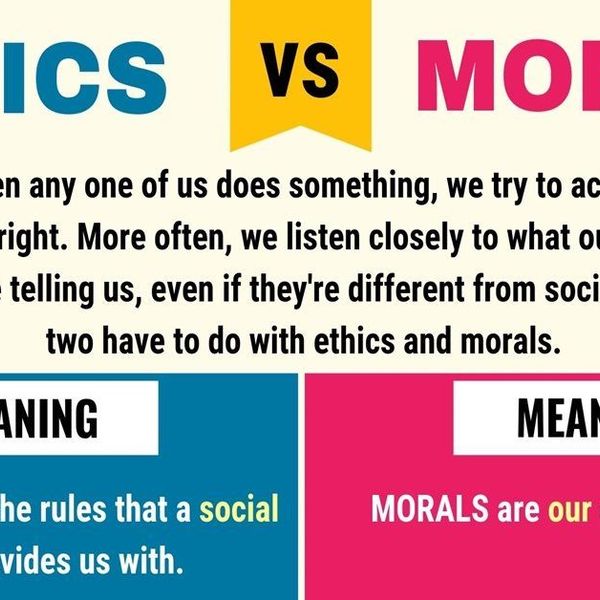For the most part, ethics can be agreed upon across the board. Ethics are usually defined by the society as a whole and is externally motivated, remaining consistent within a certain context. Many companies have a set code of ethics by which they expect their employees to conduct themselves, most must be signed. Doctors and nurses take a Hippocratic Oath, an ethical principle, to do no harm to patients. Morals are defined as a person’s standard of behavior or beliefs concerning what is right or wrong and the overall goodness or badness of human character. H. G. Fowler famously wrote, “Ethics is the science of morals, and morals are the practice of ethics.” This is to say that a person’s moral beliefs could be a derivative of an ethical principle. Contrary to ethics, morals are specific to the individual and are internally motivated. They are usually consistent but can change if the individual beliefs or outlook changes. Morals and ethics can conflict with one another at times. Lawyers have an ethical responsibility to defend their client to the best of their ability even though they may feel that the action taken by the client is morally wrong and deserves to be punished.
In 2017, United Airlines came under fire for the forcible removal of a bloodied passenger off of an ‘overbooked’ flight. The passenger, a 69 year old gentleman, was manhandled by two security officers who shoved his head against an armrest and grabbed him by his sweater askewing his glasses. The security officers then dragged him supine down the aisle and out of the plane. The incident happened after the airline asked passengers if anyone was willing to take a later flight in exchange for cash, flight credit and a hotel room so four airline employees could take the flight. When it became clear that nobody was willing to volunteer, the airline selected a few people at random giving priority to frequent fliers and higher fare-paying passengers. The gentleman refused to give up his seat because he was a doctor and had patients to tend to the next day. He was then virtually assaulted by the officers as they removed him. To make matters worse, it was later determined that the flight had actually not been overbooked making the incident not only horrific but unnecessary.
One of the biggest questions is: why didn’t the airline select another passenger after realizing passengers’ occupation presented an issue? It is understood that United Airlines reserves the right to forcibly remove a passenger from a flight as a part of their airline carriage guidelines but most say this went too far. The desensitized CEO, Oscar Munoz initially faulted the passenger for being belligerent and disruptive, backing up his employees by stating that “employees followed established procedures for dealing with situations like this.” A few days later, Munoz reissued an apology and wrote “[the incident] happened because our corporate policies were placed ahead of our shared values. Our procedures got in the way of our employees doing what they know is right.’
Though profits were not expected to take much of a hit, the #BoycottUnited hashtag took on a life of its own. Social media spread the story and customers worldwide called for a boycott. The company’s stock dropped 4.3% and though they were able to recover, they PR damage had been done. A settlement agreement was reached between the two parties and changes were made to company policies. Additionally, one of the officers was reprimanded as his actions were ‘obviously not condoned by the Department (bbc)’ and he was suspended.
The incident is a major morality issue and it is clear that the man was treated amorally. Furthermore, even though the company has the right to remove a passenger, it is not considered ethical to harm a customer. I do not agree with the incident nor do I agree with how it was handled. The CEO should not have been allowed to make a preliminary apology that blamed the customer. That decision did further damage to United’s image, making it clear that they were more concerned about profit than consumer relation. Human resources could have lent a hand with the conflict resolution. Human Resources also has a responsibility to reiterate ethical behavior and it seems they lapsed in that responsibility.

